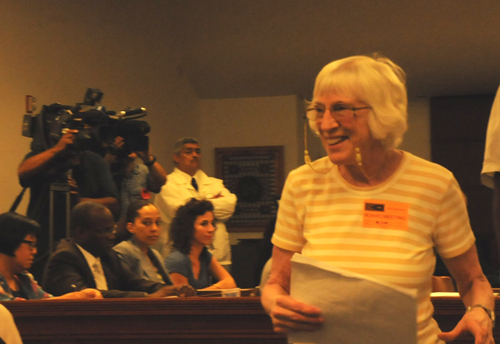BOARDWATCH: All of those who spoke on July 18 during the Board's half hour 'public participation' disagreed with the Board
After months of trying to reduce public participation to next to nothing, on the one hand, or stack it with their various Astroturf friends, on the other, the members of the Chicago Board of Education at their special meeting on July 18, 2012, added another wrinkle: the public was allowed to "speak" — but only for a half hour. No matter how many citizens wanted to bring their concerns to the Board members (six of whom were present), only as many as could present their concerns during that half hour were going to be allowed to speak.
 Anne Schultz after speaking to the Board on July 18, 2012. Substance photo by George N. Schmidt.In this Substance contribution, we are going to publish the words of those who did get to speak as they were provided to us by the speakers.
Anne Schultz after speaking to the Board on July 18, 2012. Substance photo by George N. Schmidt.In this Substance contribution, we are going to publish the words of those who did get to speak as they were provided to us by the speakers.
ANNE SCHULTZ on the value of imagination and the perils of large class sizes...
My name is Anne Schultz, and I worked for over 20 years for Northeastern Illinois University as a consultant in the Chicago Public Schools, until I retired — at first, with writing for all grades, K – 12; later in a music and literacy project created specifically for Kindergarten through second grade, in which we worked collaboratively with the teachers to use the arts to increase children’s ability to imagine and to think metaphorically, and thus to develop higher order thinking skills.
This became a research project, in which, working collaboratively with the teachers, we explored the idea that integrating the arts into the basic curriculum — in the case of this particular project, this meant weaving music, creative movement, visual art, storytelling, and writing together — would not only expand the children’s natural capacity to imagine, and increase their writing ability and reading comprehension; but would simultaneously increase their ability to pass the standardized tests that are required of them, starting with the third grade.
In a school in which we piloted the project, children who had been with it throughout all the three years aced the tests, amazing their school and the Board evaluator who examined the results; such 3rd grade scores had never been seen in this school before. The only variable was our program.
Imagination is the tool we use to integrate our learning into our experience, therefore to know and to understand what we have learned. Without imagination, real learning does not take place.
I also want to address the issue of class size, with one simple story. One of the teachers in the Music and Literacy project, one of the best teachers with whom I have ever worked, told me that when she received the letter that told her she would have 27 children (and maybe more) in her kindergarten class, she sat down and burst into tears. “I just can’t do it”, she said. This issue of the increase in class sizes is obscene.

